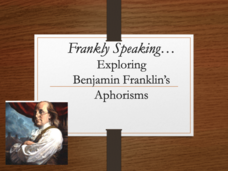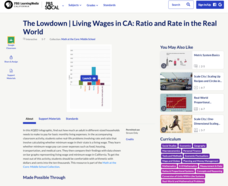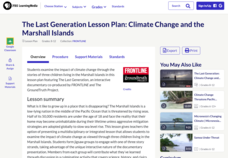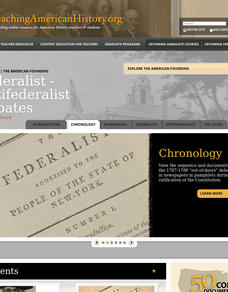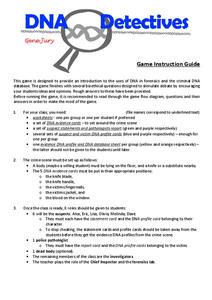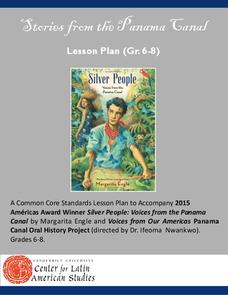Australian Human Rights Commission
An Introduction to Human Rights and Responsibilities
How are your students' rights protected? What are their responsibilities in protecting the rights of others? A lesson on human rights and the responsibilities therein introduces class members to the concepts of global citizenship,...
Chandler Unified School District
Frankly Speaking: Exploring Benjamin Franklin's Aphorisms
Benjamin Franklin famously had an aphorism for every situation—most of which we still use in modern vernacular. Introduce class members to Franklin's Poor Richard's Almanack with a presentation that details the characteristics of aphorisms.
PBS
The Lowdown — Living Wages in CA: Ratio and Rate in the Real World
How much money is enough money? Future wage earners explore the minimum hourly wage and then use it to calculate monthly and yearly earnings. They use an interactive to consider living costs and determine whether earning a minimum wage...
PBS
Real-World Proportional Relationships: Gender Wage Gap
When will the gender wage gap disappear? Scholars use a provided infographic to see trends in wage gap over time. They use ratios of women's wages to men's wages to determine which decades had the greatest change in the wage gap. The...
PBS
The Last Generation: Climate Change and the Marshall Islands
Are some families down to their last generation? The final segment of a two-part climate change series investigates the vanishing Marshall Islands. Scholars divide into research teams to analyze three different individuals whose lives...
PBS
The Last Generation
How does climate impact the town, city, or area where people live? Scholars research the concept of climate change as it pertains to the Marshall Islands. The opening lesson of a two-part series uses interactive online resources and...
Ashbrook Center at Ashland University
Ratification of the Constitution
How difficult was it to get everyone to agree on the contents of the Constitution? Historians analyze the task of the Founding Fathers in creating the United States Constitution. They research a directory of video clips, primary sources,...
Ashbrook Center at Ashland University
Bill of Rights
Do citizens need protection from the federal government? Scholars investigate why the framers of the Constitution created the first 10 amendments and what these amendments mean to citizens of the United States more than 200 years later....
Ashbrook Center at Ashland University
Federalist - Antifederalist Debates
Who should have the power—individual states or the federal government? Scholars research the arguments of the Federalists and Anti-Federalists during the formation of the United States Constitution. Online resources, including a vast...
Ashbrook Center at Ashland University
The Constitutional Convention
Imagine sitting down with representatives of your school to write a new student handbook. What arguments would ensue? How would compromises be made to finish the project? Scholars research the Constitutional Convention using a directory...
University of Minnesota
Making an Immigrant Story
Budding historians research the trip immigrants to the United States take and the reasons behind their willingness to start over in a new place. Groups create their own video lessons outlining the story of human migration from departure...
Mission India
My Passport to India: What's Caste Like?
To gain an understanding of what it was like to live under India's caste system, class members engage in a role-playing activity that assigns group members to four different groups, each with different rules for behavior.
Oklahoma Bar Association
Into Which Caste Have You Been Cast?: India's Caste System
What was it like to fit into a certain class with no choice in the matter? Learners experience the caste system in a role-play activity, work individually on handouts to enhance their learning, and participate in an evaluation activity...
Independence Hall Association
American History: From Pre-Columbian to the New Millennium
Need an online resource to supplement the paper textbook in your classroom? An all-encompassing website covers historical events throughout the last half of the second millenium, leading right up to the third. From the pre-Columbian...
Judicial Learning Center
How to Create a Law
Laws affect everything from a scholar's favorite public park to rules in the classroom. Express the importance of lawmaking and teach how they relate to every facet of life with a resource on how a bill becomes a law.
Gene Jury
DNA Detectives
Police find a man murdered in a local hotel, DNA everywhere, and now they need scholars' help. Budding detectives step into a crime scene playing the roles of victim, suspects, and investigators. They apply knowledge of criminology and...
Equality and Human Rights Commission
Taking Action
The Universal Declaration of Human Rights passed in 1948 when the majority of members of the United Nations voted in favor of the resolution. Scholars use their knowledge of human rights to determine ways they personally can help promote...
Equality and Human Rights Commission
Influencing Attitudes
Does propaganda—like that used during the first World War—exist today? The 11th instructional activity in a series of 12 highlights the role of media when it comes to influencing attitudes. Scholars learn about sensational headlines,...
Equality and Human Rights Commission
How Do Human Rights Work?
Do human rights apply to children? Scholars learn of three children asking for help to determine their rights and how to handle specific situations. Class members must research any laws pertaining to the requested right and how the...
Equality and Human Rights Commission
Equality
Despite passing the Equality Act in 2010 covering many groups, gender inequality in Great Britain remains. Scholars investigate the concept of equality with a presentation, discussion, and hands-on timeline activities. The seventh lesson...
Judicial Learning Center
The Bill of Rights and Civil Liberties
Why is the Bill of Rights so important to American's civil liberties? An important resource helps scholars find these answers and more by reading through state and federal constitutions to discover their own civil liberties. The activity...
Judicial Learning Center
Do You Know Your Bill of Rights?
The Bill of Rights is much more than an important piece of paper! The rights cover everything from freedom of speech to the right to remain silent if arrested. Scholars find out their own rights by answering the questions in the form of...
Judicial Learning Center
Article III WebQuest
Why is Article III of the constitution so significant? Pupils discover the importance of Article III and how it relates to past as well as current events by completing Internet research using a provided handout. They learn everything...
Vanderbilt University
Stories from the Panama Canal
The stories of the Silver People, the West Indies immigrants hired to work on the Panama Canal, come to life in a lesson about the building of the Panama Canal. Groups research why the canal was built, how it was build, the working...



